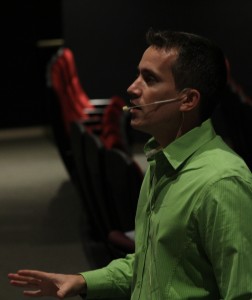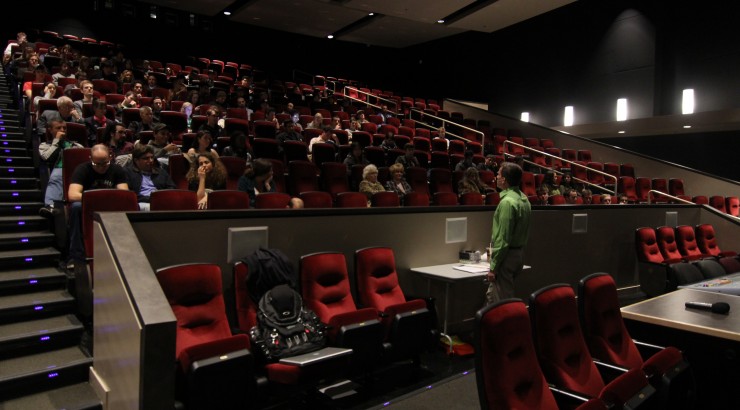Peter Debruge, Variety Film Critic and Dodge College Professor: What I Learned Teaching Film School
June 25, 2013
Adjunct Professor of Film Studies – and Senior Film Critic for
Variety
– Peter Debruge describes his surprising experience teaching in our Graduate film program.
Peter Debruge, senior film critic for the premiere industry magazine-cum-online-powerhouse
Variety
, was recently offered an adjunct professorship within our hallowed halls. He’s been teaching “Evolution of Narrative Film” to the incoming Graduate class for just over a year now, and the experience has proven to be just as thought-provoking to him as it was to our students. In a feature published in the most recent issue of
Variety
, and now available online,
Mr.
Prof. Debruge (
@AskDebruge
) begins,
When Dodge College dean Bob Bassett initially approached me a year ago about teaching a film studies course at Chapman, he charmed me with the idea of how much the students could learn from a film critic who sees several hundred new releases a year. The truth is, no one learned more from my first two semesters of teaching than I did.
Dean Bob Bassett recently said of the class,
I am tremendously proud of the incredibly talented faculty we have assembled, which includes many outstanding adjuncts. Among those is Variety’s Senior Film Critic Peter Debruge, whose class I have had the opportunity to attend a number of times. Peter authored a piece that appeared in today’s Educational Impact issue of Variety about his experience teaching at Chapman that captures perfectly my thinking about how important it is to prepare our students for an ever-changing business.
Shared in part here, (
please visit the original article in its entirety here
) you can see the challenging, dialectic nature of our Graduate level program, which exposes students to a multitude of viewpoints, influences, and professionals from the film industry. Something we don’t think about quite as much – although clearly evident in the
quotes of visiting professionals
– is the reciprocal learning that takes place in the classroom, feeding youthful inspiration back into the industry, from the ground up, from student to teacher.
It’s been just over a dozen years since I graduated film school from the U. of Texas at Austin, a program where world-class professors shared their passion for the likes of Alfred Hitchcock, Orson Welles and Jean Renoir — for the canon of accepted masters, in other words.

But Bassett came to me with a different pitch. An outside-the-box thinker at the helm of a relatively young (and well-funded) film school, Bassett was determined to innovate — as opposed to imitate — what other film production programs were doing. A few years earlier, he’d poached a sizable chunk of the American Film Institute’s faculty, but he wasn’t interested in re-creating their conservatory model. He raised the funds to build a $52 million, state-of-the-art production facility for his students (reportedly the model for USC’s new George Lucas-funded complex) and preached a practical, hands-on approach.
As Bassett explained, the goal of my graduate Evolution of Narrative Film class wasn’t to rehash film history, but to identify the trends bubbling up in festivals and megaplexes. Rather than teaching “Casablanca” and “Citizen Kane,” I might show “Borat” and “The Bourne Identity,” addressing everything from non-linear storytelling to mock-doc techniques and the recent found-footage craze.
Now, here’s where I suspect I got more out of the class than my students. For years, I had been watching movies strictly as a critic, but this assignment gave me a second set of eyes. Instead of viewing in a vacuum, I found myself considering how all those movies connect to one another, asking what each one borrows and how it innovates. In deciding which pics to screen, I was astonished at how many of my favorites (including those “Bourne” sequels) didn’t hold up, while others (like “Borat”) were even more revolutionary than I’d given them credit for.
(…)
Meanwhile, on the students’ side, it’s not enough to say, “I want to become a movie director.” As Roger Ebert told such dreamers, “That’s your first mistake — to word it that way. Say, ‘I am a movie director.’ Give yourself the title. No one else will. Then go off and make your movie.”
Please read the entire article in
the Variety Film Features section
.
Dodge College is also highlighted in Variety’s “Film School Progress Reports,” acknowledging the conclusion of filming on Chapman Entertainment’s first feature film,
Trigger
, alongside other film school’s film schools’ “new offerings, facilities, and staff at the top programs.”
Of course, there weren’t any others producing their own movies.
![]()


